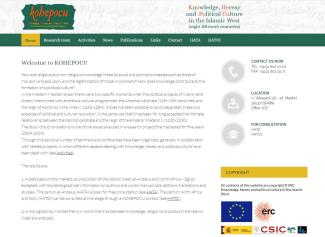KOHEPOCU. Knowledge, Heresy and Political Culture in the Islamic West (8th-15th centuries)
How are religious and non-religious knowledge linked to social and political processes such as those of inclusion and exclusion, and the legitimization of those in command? How does knowledge contribute to the formation of a political culture?
In the Western Mediterranean there were two specific moments when the political projects of rulers were closely intertwined with ambitious cultural programmes: the Almohad caliphate (12th-13th centuries) and the reign of Alphonso X the Wise (r. 1252-1284). It does not seem possible to study separately these two episodes of ‘political and cultural revolution’, in the same way that it has been for long accepted the intimate relationship between the Fatimid caliphate and the reign of the emperor Frederic II (1220-1250).
Proyectos de investigación




